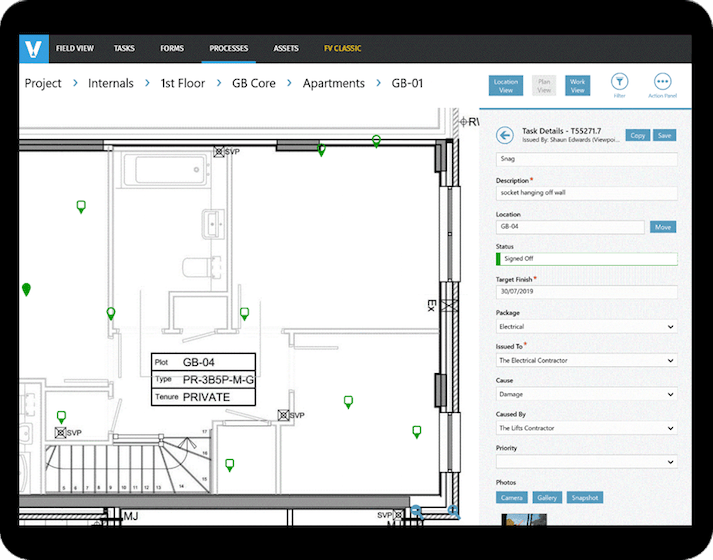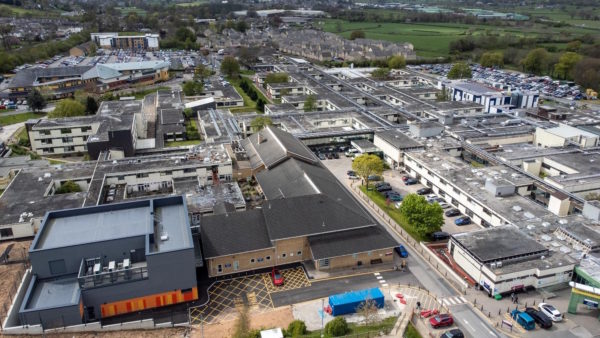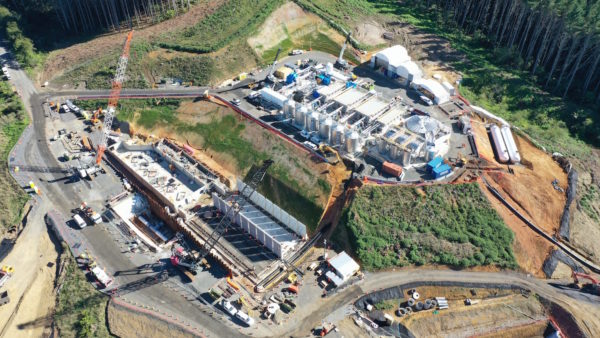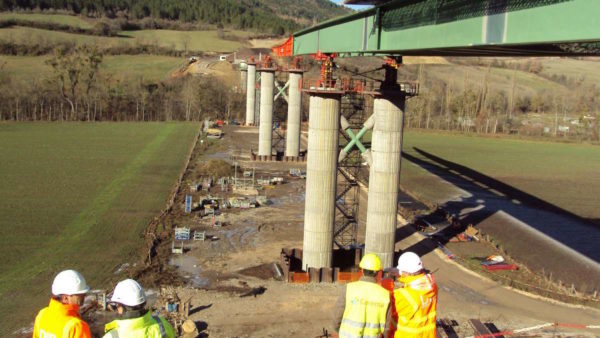Among the 50 live Wates Construction sites shut down by the first covid-19 lockdown was the Nottingham College City Hub. Once allowed to re-open the site, Wates turned to cloud-based project management software to help maintain progress once work could continue on site.
Client: Nottingham College
Architect: Bond Bryan
Main contractor: Wates Construction
When the first covid-19 forced projects to shut down at a moment’s notice, construction businesses were forced to find new ways of operating and keeping workers safe. For Wates Construction, which had 50 live sites across England, this was a business-critical moment.
“Like many other businesses across the country, we had no choice but to shut down,” says Adam Cannon, project director at Wates. “As the crisis developed, we took measures every step of the way, but when the lockdown was announced in late March, we decided as a company to press pause. We weren’t comfortable letting our teams work under existing protocols with the potential health risks from covid-19.”
With work halted, a team began working around the clock to analyse all aspects of Wates’ operating procedures and establish a model that would allow projects to continue moving forward while protecting the health and wellbeing of those working on site. “Being able to return to work hinged on our ability to manage our sites safely in line with the requirements of the Construction Leadership Council’s (CLC) site operating procedures,” says Cannon. “Our teams were extremely diligent in identifying a combination of technology and processes that would keep our workers safe.”
Two days later, the company’s projects were up and running again, including The Nottingham City Hub, which was one of the company’s flagship projects for the Midlands.

Being able to return to work hinged on our ability to manage our sites safely in line with the requirements of the Construction Leadership Council’s site operating procedures.– Adam Cannon, Wates Construction
Resuming site operations
Intended to revitalise the area, The Nottingham City Hub is a £58.5m educational facility procured via Major Works — UK, part of the Scape National Construction framework. It is designed to offer state-of-the-art facilities and resources for college students, as well as amenities including a restaurant, café and new performing arts centre.
Throughout the project, Wates engaged the local supply chain and provided training and employment opportunities for local workers, in order to ensure that the project would deliver a social, skills and economic boost to the city. To date, more than 80% of the entire City Hub supply chain has been sourced from businesses within a 64-km radius of the site and just under 25% of the full £238m supply chain spend was sourced from within a 16-km radius.
With the project impacting local students, jobs and the overall community, continuing to make progress safely was critical. For years, Wates relied on Viewpoint Field View, a cloud-based and off-line project management solution to streamline field tasks and automate workflows for quality assurance/quality control, safety, project delivery and handover. It also served as an essential communications tool, helping ensure that everyone was on the same page when it came to the timeline, budget and safety protocols — both before and after covid-19 hit.
In fact, it was because of Field View that Wates was able to resume the project after just two days, which was achieved by reviewing government guidelines and putting new procedures into place, largely through new, customised safety forms that were created and facilitated through Field View. Stringent covid-19 safety precautions were put in place and managed and recorded via Field View to ensure site staff were able to observe social distancing when carrying out their activities.
The requirements of the CLC’s site operating procedures were also translated into Field View so that an appropriate covid-19 Action Plan could be implemented to ensure that people could travel to work safely, works were planned to avoid close working and that appropriate welfare facilities were in place. Compliance could then be evidenced by means of completed records and Field View photos.
Where an activity could not be carried out in line with distancing requirements, a covid-19 specific permit was created in Field View to ensure that risks were minimised as far as possible and people were able to work in a controlled and safe manner.

A screengrab showing an example of snagging in Viewpoint
A covid-19 site diary was produced in Field View to enable site teams to accurately capture in real-time how the pandemic was affecting project delivery, including its impacts on labour resources, availability of materials and equipment, sequence of works and working hours. This enabled managers to monitor progress, assess the impacts and take appropriate action, thereby ensuring that the project could run at optimum capacity.
Daily safety briefings were also held to view the data captured and discuss any potential health concerns or snag-related issues. With Field View, snags can be captured with photos, which are then uploaded into the system in real time and subcontractors and other relevant stakeholders are immediately notified of them. All the snags are visible on the platform, making it that much easier to fix the snags and manage the project overall.
Wates originally had 230 staff working on site before covid-19 hit and although it was not possible to get back to a full complement, the site was run and the project completed with 170 people, largely due to the ability to easily manage site activities through Field View.
Increased productivity
Field View enabled Wates managers to spend between two and three hours extra on site per days vs. having to constantly go back to the office to complete paperwork. This saved the company in the region of £40,000 throughout the remainder of the project.
“Field View has been a key element in keeping workers on the City Hub site safe,” says Cannon. “Not only did it enable us to get the project back on track and delivered on time, but it also kept everyone safe in the process. I can’t imagine how we would have captured data and ensured protocols were followed without it.”
Covid-19 pending, Nottingham City Hub will welcome students this spring, providing new opportunities for students and the city at large. Not only will the project help revitalise the college and surrounding area, it has also helped to illuminate the role that technology can and will likely continue to play in helping to sustain construction operations in light of the pandemic.
While covid-19 accelerated technology adoption for many construction businesses, the need to automate workflows, capture covid-specific project information and close the gap between the office and the field was already there.
“Innovating to identify safe ways to continue work and accelerating the use of technology has reinforced our reputation as a can-do contractor,” says Cannon. “The technology that is allowing us to keep projects on schedule during covid-19 is also going to help us grow the business and meet future demands. It’s a win-win."













